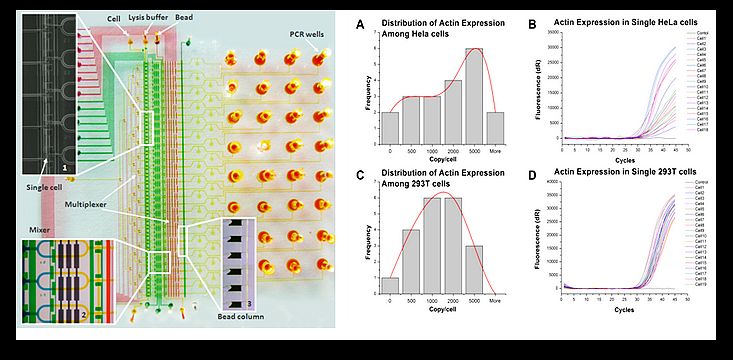The research team led by Deputy Researcher Chen Yan of the Institute of Medical Technology, Shenzhen Institute of Advanced Technology, Chinese Academy of Sciences has made important progress in the research of microfluidic technology. Researchers have developed high-throughput microfluidic chips for the evaluation of tumor cell gene expression levels. This technology can be developed into a new technology for early diagnosis and analysis of cancer. On June 13th, relevant research results were published online in the lab on a Chip, a well-known international microfluidic chip field journal.
Microfluidic technology is the technology and science of manipulating nanoliter to picoliter volume fluids in micron-scale structures, and is a frontier cross-cutting field that has risen rapidly in the past decade. Carrying out biochemical reactions on a microfluidic chip has many advantages such as low reagent and sample volume, fast real-time, parallel processing of a large number of samples, and prevention of cross-contamination of samples. In the latest research, researchers at the Institute of Medicine have built a unique integrated microfluidic chip to perform large-scale single-cell gene expression analysis for different types of tumor cells. Gene expression analysis at the single cell level is of great significance in the research of stem cells and tumor diseases. In the cell population, in-depth understanding of gene expression heterogeneity is an important factor in understanding the occurrence and development of tumors, and has great application prospects in assessing gene stability, identifying biomarkers, and personalized treatment. However, the genetic analysis of tumor cells requires the processing of a large number of cell samples. The traditional method has the disadvantages of high work intensity and low analysis throughput. The new microfluidic technology developed this time successfully overcomes these difficulties and can be batched at the same time. Carry out independent automated analysis of cells to prevent cross-contamination between cells and efficiently extract gene expression information of tumor cells.
The microchip designed by the team integrates a series of biochemical sample processing units such as single-cell capture, lysis, purification, and reverse transcription. The size is five centimeters square, and can be independently addressed by the built-in pneumatic microvalve to achieve single Automated manipulation of the entire process of cell processing and analysis. The experimental results show that this platform can achieve the assessment of the stability of cell gene expression levels, and distinguish tumor cells of different types and different stages through the pattern of gene expression distribution at the single cell level.
This new "chip laboratory" technology has great potential for application in the field of early diagnosis of tumors.
The above research work was supported by the National Natural Science Foundation of China, the Guangdong Innovation Research Team Project and the Chinese Academy of Sciences Knowledge Innovation Project. The research work was completed by Zhang Baoyue, Feng Hongtao and Shu Weiliang, the backbone members of the micro-nano biochip laboratory.

Automated microfluidic chip for evaluating gene expression stability of tumor cells
Henan Daxin Cosmetics Co., Ltd. , https://www.dx-cosmetics.com
![<?echo $_SERVER['SERVER_NAME'];?>](/template/twentyseventeen/skin/images/header.jpg)